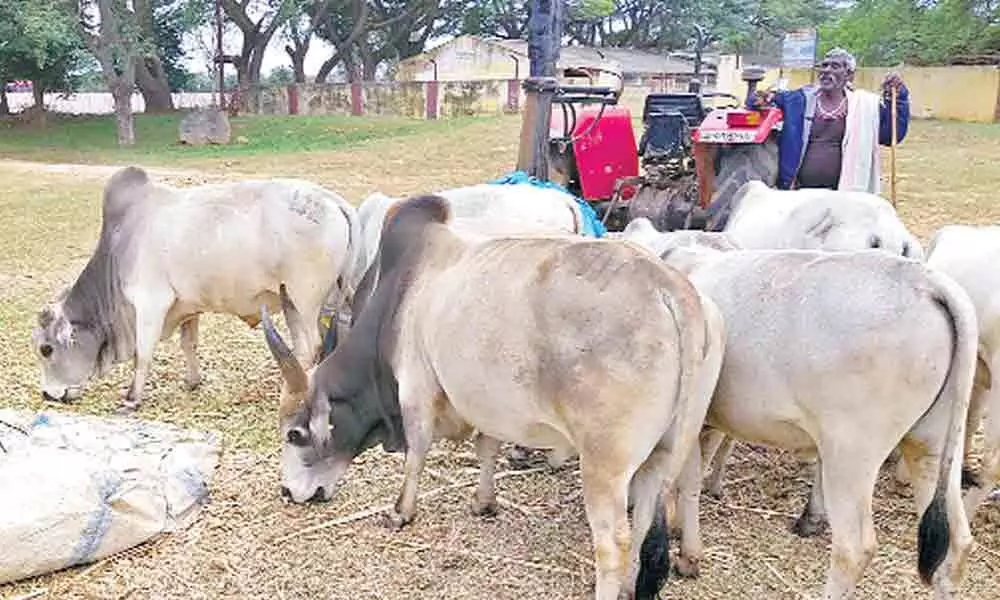Live
- Blinkit Now Delivers Laptops, Monitors, and Printers in 10 Minutes
- OnePlus 13 First Sale Begins Today: Price, Offers and Discounts
- Wilting MVA in Maha, Sanjay Raut dares Congress to announce end of INDIA bloc
- Krishna Janmabhoomi-Shahi Eidgah dispute: Consolidation of suit should benefit both sides, says SC
- Champion of stronger relations with India, Chandra Arya runs for Canadian PM's race
- Thai Chicken Sliders
- Plant-based chicken seekh kebab kathi roll
- Chicken Keema Kebab
- Tragic Bus Accident in Suryapet District: Four Dead, 17 Injured
- Madhur Sharma launches new EP ‘Reversion’; announces nationwide tour
Just In
'Mission Punganur' soon to protect native breed cow


The native virgin Punganur breed cattle became almost an endangered species. The AP government is planning to launch Mission Punganur.
Amaravati: The native virgin Punganur breed cattle became almost an endangered species. The AP government is planning to launch Mission Punganur.
Chief Minister Y S Jagan Mohan Reddy also directed the officials concerned to take necessary steps to protect the native breed including Punganur and Ongole cattle varieties.
The Punganur cattle fall under the Zebu category in scientific terminology. The cattle is drought resistant, short variety, a cow gives around 700 to 750 litres of milk over a lactating period, most of the people believe that its milk has lots of medicinal values.
At present, there are only around 200 known cows and bulls of our local variety virgin Punganur breed available, said Poonam Malakondaiah, Special Chief Secretary, Animal Husbandry department, speaking to The Hans India. She further explained that the breed gives good quality milk and mortality rate is very less.
The Punganur cow's milk has many medicinal values, the cow dung is highly useful for those adopting Zero Budget Natural Farming (ZBNF). The cow dung serves as a rich fertiliser source and its urine is being used for pest control in agriculture.
Apart from that, Punganur cow is considered as most sacred by Hindus.
Poonam Malakondaiah said that the department has aimed at increasing the local varieties of both Punganur and Ongole breeds under the Mission Punganur programme. She informed that the Chief Minister had directed them to put all efforts to preserve the local varieties.
"The cow dung will help improve the productivity of our soils. It is best suitable for those practising ZBNF. Cross breed cows do not serve the purpose.
When we came to know the population of Punganur cows, we were surprised. The population of Ongole cattle currently is about 10,000 while that of Punganur cattle is only 200.. There are some mixed and cross variety of Punganur cows available. But, the focus is on developing original breed," she explained.
Dr G Gangaraju, Principal Scientist and Head at Livestock Research Station (LRS), Palamaner said that the Punganur cattle's dung and urine are rich source of fertiliser and pest controller for organic farming.
The production also increased from 20 to 30 per cent in organic farming. It has already been proved in Punganur and surrounding areas.
Since 2015, cow's urine and dung are being used for ZBNF. The farmers said that there was improvement in the quality of produce and increase in yield. Shelf life of the produce also increased after using the manure. It has so far been used in floriculture and horticulture.
Gangaraju said that they have been rearing the Punganur cattle at the LRS.
Poonam Malakondaiah said, "Under the Mission Punganur programme, government will increase the population of the cattle.
IVF technology, genome technology and vaccines production technology will be introduced for these cattle at AP Centre for Advanced Research on Livestock (APCARL) located at Pulivendula in Kadapa."
She further added that the developed cattle will be distributed to farmers under the 'Polam Badi' programme.

© 2025 Hyderabad Media House Limited/The Hans India. All rights reserved. Powered by hocalwire.com






